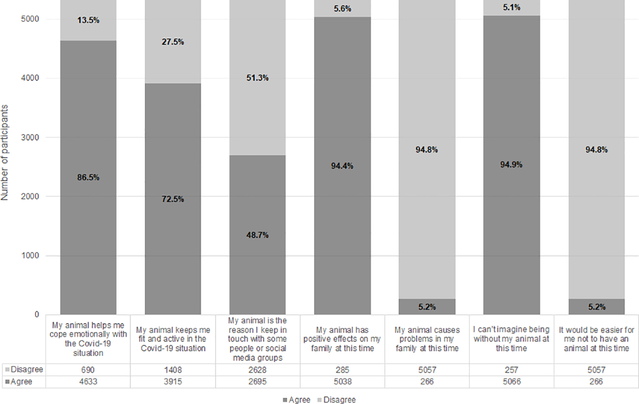Animal Behavior
Are Emotional Support Dogs Always a Cure-All?
In one survey, 100% of people say yes. Are they right?
Posted December 2, 2020 Reviewed by Gary Drevitch

I recently read an essay by Lily Velez called "Newly Released Study Reveals Health Benefits of Emotional Support Animals" in which we're told, "All participants reported that their quality of life had noticeably improved with an ESA dog" (my emphasis). In this piece the following data from a joint collaboration between The Assistance Dog Center (TARSQ) and CertaPet were reported for 298 people living in nine countries who had taken an online survey between October 12, 2018 and December 7, 2018 consisting of 46 questions that focused on their emotional support dog.
98.93% reported an increased zest for life.
98.58% reported an increased sense of motivation in everyday life.
94.4% mentioned less generalized anxiety disorders.
88.89% experienced a reduction in panic attacks.
88.89% felt able to resume education, work, or training.
83.33% felt an improvement in compulsive thoughts.
77.78% felt an improvement in compulsive acts.
A large number of the participants claimed that the companionship of their emotional support dog provided an increased feeling of security (99.29%), independence, and energy (97.86%) while also reducing stress and improving sleeping patterns (96.80%). All in all, 100% of the participants reported that their quality of life had noticeably improved with an emotional support dog. I'm always leery when I read that the results of a study are 100% anything, but we're told this is true for this particular one.
It's important to keep in mind that these dogs were emotional support animals and I offer some words of caution below.
We're also told that 285 of the 298 participants (95.6%) wanted to have another ESA dog when their current dog died. The other 13 people said they would prefer a service dog over an ESA because service dogs are less limited in where they can go in public venues. I just learned that the United States Department of Transportation (DOT) has determined that airlines are not required to recognize emotional support animals as service animals and may treat them as pets.2
The researchers conclude, "Based on our findings, there exists a strong correlation between the acquisition of an ESA dog and improvements in an individual’s mental, emotional, and/or physical health. ESA ownership appears to help mitigate the detrimental symptoms of many mental and emotional illnesses such as panic attacks and lack of motivation."
The results of this online survey are consistent with another study conducted by Elena Ratschen and her colleagues called "Human-animal relationships and interactions during the Covid-19 lockdown phase in the UK: Investigating links with mental health and loneliness." These researchers studied 5,926 participants of whom 5,323 (89.8%) had at least one companion animal. They reported "The vast majority of companion animal owners stated that their animals constituted an important source of emotional support (Fig 1), with dogs, cats, horses and other companion farm animals scoring highest across most support domains." These were not emotional support or service animals.

The researchers also offered data collected during the COVID-19 pandemic highlighting just how helpful and unproblematic service animals of different species are perceived to be (see table below). They concluded, "Animal ownership seemed to mitigate some of the detrimental psychological effects of Covid-19 lockdown."

The data from both of these studies are especially relevant given the current COVID-19 pandemic. Velez writes, "Nearly half of Americans have reported negative impacts on their mental health as a result of the COVID-19 pandemic." Comparative data from other countries would be very useful for determining if and how people from different cultures have responded to the pandemic and how other animals might help them along.
Some words of caution: Pets aren't always panaceas
"The bottom line is that a substantial majority of the 21 studies did not find that people living with pets are less lonely than people without pets. Further, only one of the eight studies conducted in the last five years found strong evidence that pets reduce loneliness." —Hal Herzog, Can Pets Relieve Loneliness In the Age of Coronavirus?
"Most research does not support the claim that pet ownership is related to lower rates of depression." —Herzog, The Sad Truth About Pet Ownership and Depression
The data in the above two studies are rather robust and can be contrasted with the results of other studies looking at the effects of service dogs and other animals on their humans' well-being. The facts clearly show that companion animals (aka pets) don't necessarily love and unwind us.1 When one does the math after analyzing different studies on the health effects of living with a companion animal, it's clear that for some measures there were a large number of people who did not receive health benefits of living with a pet. Hal Herzog's analyses reported in the essays above also support this conclusion.
All in all, data clearly show that pets aren't panaceas for lifting one's spirits. Perhaps it's because there are marked individual differences among people who choose to bring a companion animal into their lives and the reasons underlying this decision won't be cured by the presence of a pet. Or, perhaps it's because the people aren't really ready to share their home with another sentient living being. Or, it's because the people don't get what they expect and need from their new friend, namely, an unconditional lover who'll be there for them 24/7 regardless of how they're feeling.
When one considers what we now know, it's clear that while there is some evidence that shows that some pets have some beneficial effects for some people, sweeping and uncritical conclusions that pets are likely to be remedies for this or that problem don't match what we know. More data from other studies of ESA's are needed.
What about the dog's well-being?
The relationship between an emotional support or service animal and their human must be viewed as a two-way street in which the nonhuman's well-being is given equal consideration. I hope that further studies will also consider the well-being of emotional support dogs and other animals.
There are many details that require serious consideration, including whether one should go ahead and foster or adopt a companion animal, and why they're doing it in the first place. Taking another living being into your home and hopefully into your heart is a huge decision, and it's not the right move for a good number of people because they will not be able to give their new companion what they really need. Choosing to live with a companion animal is a two-way street and all participants have to benefit—it's got to be good for you and your new friend.
Clearly, we need a lot more information about just how effective emotional support and service animals truly are. Available data go all over the place and while studies such as the ones I'm discussing here offer some very positive results, this is not always the case.
I look forward to much more research on the benefits of living with dogs and other companion animals and more critical analyses of when and why they do and when and why they don't. I also look forward to studies that focus on all individuals, human and nonhuman, who are part of the ongoing and dynamic social relationships. When it's a two-way affair that benefits all participants, it's a win-win for all. However, far too often it's not.
References
Notes
1) Detailed summaries of a large dataset can be found in my essay "Do Pets Really Unconditionally Love and Unwind Us?" and in Hal Herzog's "Can Pets Relieve Loneliness In the Age of Coronavirus?" and "The Sad Truth About Pet Ownership and Depression".
2) For more details about the crackdown on emotional support animals click here.
Bekoff, Marc. Choosing a Goat for Emotional Support Can Limit Options.
_____. Support Animals Aren't a Waste of Time or a Panacea.
_____. Birds of a Feather: Hope, Healing, and the Power of Animals.
_____. Are Therapy Dogs Always Stressed?
_____. Transforming Trauma: Healing Through Connecting with Animals.
_____. Animal Assisted Play Therapy: An Integrative Approach.
_____. Are You Ready to Give Another Animal the Best Life Possible?
_____. Living With a Dog Is Good, If It's Good for You and the Dog.
_____. Dogs Want and Need Much More Than They Usually Get From Us.
Czeisler, Mark É. et al. Mental Health, Substance Use, and Suicidal Ideation During the COVID-19 Pandemic — United States, June 24–30, 2020. Morbidity and Mortality Weekly Report (MMWR) published by the CDC, August 14, 2020.
Ratschen E, Shoesmith E, Shahab L, Silva K, Kale D, Toner P, et al. Human-animal relationships and interactions during the Covid-19 lockdown phase in the UK: Investigating links with mental health and loneliness. PLoS ONE 15(9). 2020.
Tedeschi, Philip and Molly Anne Jenkins. (editors). Transforming Trauma: Resilience and Healing Through Our Connections With Animals. Purdue University Press, 2019.




